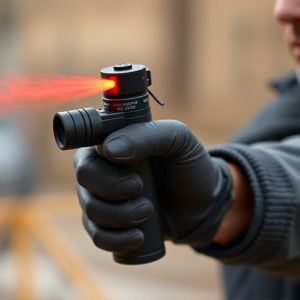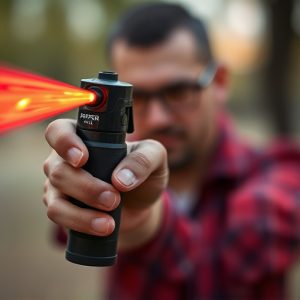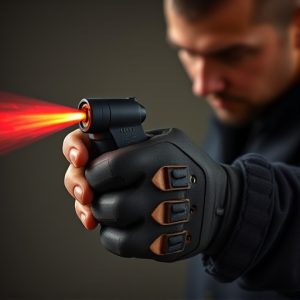Concentrated Capsicum Spray: Effectiveness in Diverse Climates & Safe Use Guide
Pepper spray, derived from chili peppers, is a powerful non-lethal self-defense tool effective acros…….
Pepper spray, derived from chili peppers, is a powerful non-lethal self-defense tool effective across various climates due to its active ingredient, capsaicin. While environmental factors like temperature and humidity impact application techniques—adjusting for freezing in cold or reduced concentration in hot, humid conditions—it remains a reliable option for personal safety. Optimal performance requires understanding tailored application methods based on climate, aiming at the face and eyes from close range, and using protective gear to minimize irritation. Global legal frameworks regarding pepper spray vary widely, emphasizing the importance of training and responsible deployment, especially in diverse climates where its effectiveness can be influenced by temperature and humidity.
In today’s diverse and often unpredictable world, having a reliable self-defense tool is paramount. One such device gaining prominence is concentrated capsicum spray, a potent option known for its effectiveness in various environments. This article delves into the science behind pepper spray’s impact on different climates, explores optimal application techniques, and examines legal considerations to ensure safety when facing potential threats. Understanding these factors empowers individuals to make informed decisions about their protection.
- Understanding Concentrated Capsicum Spray: A Powerful Self-Defense Tool
- The Science Behind Pepper Spray's Effectiveness in Various Environments
- Climate Considerations: How Temperature and Humidity Impact Pepper Spray Performance
- Application Techniques for Optimal Protection
- Legal Aspects and Safety Precautions When Using Concentrated Capsicum Spray
Understanding Concentrated Capsicum Spray: A Powerful Self-Defense Tool
Concentrated capsicum spray, often referred to as pepper spray, is a powerful self-defense tool that has gained immense popularity for its effectiveness in neutralizing potential threats. This non-lethal weapon works by irritating the eyes and respiratory system of the assailant, providing users with valuable time to escape or seek help. The active ingredient, capsaicin, is derived from chili peppers and is known for its ability to cause a burning sensation, temporarily blinding the attacker and allowing the user to defend themselves until assistance arrives.
One unique aspect of concentrated capsicum spray is its versatility across different climates and environments. Whether used in hot, dry desert conditions or humid tropical forests, pepper spray maintains its effectiveness due to the potency of capsaicin. This makes it a reliable option for outdoor activities, travel, and personal safety, especially when navigating areas with varying weather patterns and habitats where traditional self-defense methods might be less dependable.
The Science Behind Pepper Spray's Effectiveness in Various Environments
Pepper spray, a potent chemical agent derived from capsicum fruits, has gained widespread recognition for its effectiveness in self-defense. The science behind its success lies in its unique ability to disrupt normal bodily functions when deployed. In various environments, pepper spray’s efficacy remains consistent due to its non-lethal nature and quick-acting properties.
Different climates don’t diminish its power; instead, they may influence the application method slightly. For instance, in colder regions, the spray can freeze upon impact, ensuring it sticks to the target. Conversely, warmer climates might require a slight adjustment in concentration to maintain optimal visibility and iritation without excessive steaming that could obscure vision. Regardless of the setting, pepper spray’s active ingredient—capsaicin—disrupts the nervous system, temporarily blinding and disorienting assailants, providing valuable time for escape or assistance.
Climate Considerations: How Temperature and Humidity Impact Pepper Spray Performance
In discussing the effectiveness of pepper spray across different climates, temperature and humidity play significant roles in its performance. Hotter climates can cause pepper spray to evaporate more quickly, reducing its concentration and impact over time. High humidity levels also contribute to faster evaporation, as moisture in the air speeds up the breakdown of the spray’s active ingredients. These environmental factors can lead to a decrease in pepper spray’s effectiveness, especially in regions with consistent heat and high humidity.
Conversely, colder climates may initially preserve the potency of pepper spray due to slower evaporation rates. However, freezing temperatures can also affect the spray’s performance, as ice crystals could form within the container or on its nozzle, potentially blocking the spray mechanism. Thus, understanding how temperature and humidity impact pepper spray effectiveness is crucial for optimal protection in various climates.
Application Techniques for Optimal Protection
When applying concentrated capsicum spray for protection, understanding the optimal techniques is key to maximizing its effectiveness. For best results, individuals should aim directly at the attacker’s face and eyes, as pepper spray is most effective when it comes into direct contact with these sensitive areas. A quick, sharp burst of the spray at close range (around 2-3 feet) ensures maximum impact without giving the assailant time to adapt or wash off the irritants.
The technique differs slightly depending on the climate and weather conditions. In dry, hot environments, the spray’s effectiveness may be reduced due to evaporation, so users should aim for a longer range (4-5 feet) to compensate. Conversely, in humid conditions, the spray can linger longer, increasing its potency. Users should also consider wearing protective clothing, such as gloves and eye protection, to minimize skin and eye irritation from direct contact with the spray.
Legal Aspects and Safety Precautions When Using Concentrated Capsicum Spray
When considering concentrated capsicum spray as a protective measure, it’s vital to explore its legal landscape and safety parameters, especially given the varying climate conditions across different regions. The effectiveness of pepper spray, a potent irritant derived from chili peppers, is well-documented in neutralizing assailants temporarily. However, laws governing its use differ significantly worldwide, with some countries permitting its sale only to law enforcement agencies while others allow civilian possession under strict regulations.
Safety precautions are paramount when wielding such powerful tools. Users must be trained to deploy the spray accurately and responsibly, aiming for non-lethal outcomes. In diverse climates, the spray’s performance can be influenced by temperature extremes; in cold weather, it might freeze and lose potency, while high temperatures could cause evaporation. Therefore, understanding local laws and climate-specific considerations is crucial for effective and safe deployment of concentrated capsicum spray as a personal defense mechanism.
Concentrated capsicum spray, with its proven pepper spray effectiveness across different climates, offers a powerful self-defense tool for individuals facing various threats. Understanding the science behind its performance in diverse environments, proper application techniques, and legal considerations ensures optimal protection. By adhering to safety precautions, users can leverage this versatile defense mechanism effectively in any situation.


